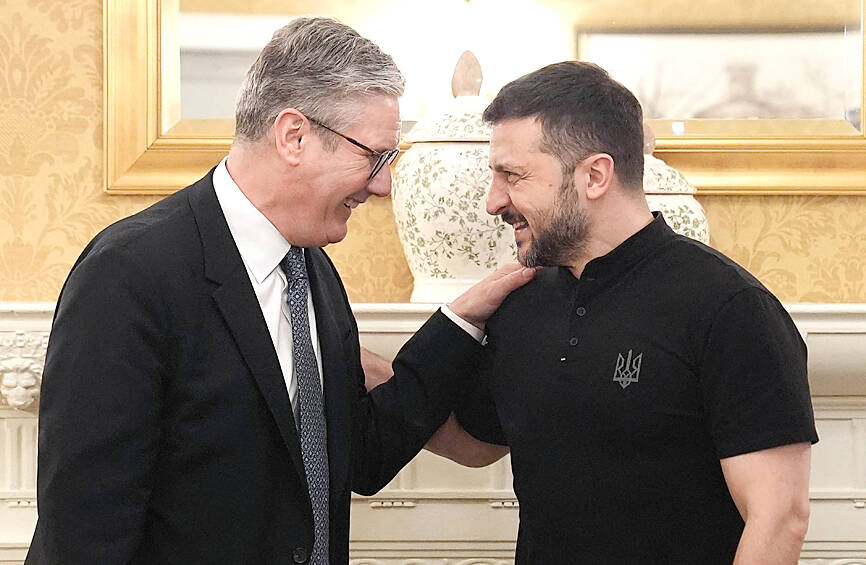British Prime Minister Keir Starmer on Wednesday made his maiden appearance on the international stage with a strong signal of support for Ukraine and a pat on the back from US President Joe Biden as they met on the sidelines of the NATO summit in Washington.
After a full day of meetings — interrupted briefly to watch part of the soccer match in which England triumphed over the Netherlands — Starmer met Biden at the White House, where the leaders extolled the US-British relationship.
Biden said he sees the UK as the “knot tying the transAtlantic alliance together.”

Photo: AFP
He praised Starmer for “seeking closer ties with Europe,” saying it would be good for the entire NATO alliance.
“The special relationship is so important,” said Starmer, who was elected on Thursday last week in a landslide over the Conservative Party, which had been in power since 2010.
Besides the coveted one-on-one with the US president, Starmer jumped into major meetings with congressional leaders, German Chancellor Olaf Scholz and Ukrainian President Volodymyr Zelenskiy — where the two men embraced — before joining other NATO leaders at a dinner at the White House.
Starmer spoke strongly on Ukraine. He reaffirmed Britain’s backing for Kyiv as it battles Russia’s invasion and said his new Labour government would “use our opportunity here with our allies to make sure that that support is agreed.”
He told Zelenskiy “there is no reduction in our support,” a video posted on Starmer’s X account showed.
The Ukrainian leader replied that his country was “very thankful for your words and steps” and for the UK being an ally since the beginning of the war.
As he arrived for the summit, Starmer said that it was important to “reinforce, in a sense as a message to [Russian President Vladimir] Putin, the resolve of NATO — bigger now than it’s ever been, more united than it’s ever been and absolutely clear-eyed about the threat of Russian aggression.”

TRAGEDY STRIKES TAIPEI: The suspect died after falling off a building after he threw smoke grenades into Taipei Main Station and went on a killing spree in Zhongshan A 27-year-old suspect allegedly threw smoke grenades in Taipei Main Station and then proceeded to Zhongshan MRT Station in a random killing spree that resulted in the death of the suspect and two other civilians, and seven injured, including one in critical condition, as of press time last night. The suspect, identified as a man surnamed Chang Wen (張文), allegedly began the attack at Taipei Main Station, the Taipei Fire Department said, adding that it received a report at 5:24pm that smoke grenades had been thrown in the station. One man in his 50s was rushed to hospital after a cardiac arrest

A car bomb killed a senior Russian general in southern Moscow yesterday morning, the latest high-profile army figure to be blown up in a blast that came just hours after Russian and Ukrainian delegates held separate talks in Miami on a plan to end the war. Kyiv has not commented on the incident, but Russian investigators said they were probing whether the blast was “linked” to “Ukrainian special forces.” The attack was similar to other assassinations of generals and pro-war figures that have either been claimed, or are widely believed to have been orchestrated, by Ukraine. Russian Lieutenant General Fanil Sarvarov, 56, head

SAFETY FIRST: Double the number of police were deployed at the Taipei Marathon, while other cities released plans to bolster public event safety Authorities across Taiwan have stepped up security measures ahead of Christmas and New Year events, following a knife and smoke bomb attack in Taipei on Friday that left four people dead and 11 injured. In a bid to prevent potential copycat incidents, police deployments have been expanded for large gatherings, transport hubs, and other crowded public spaces, according to official statements from police and city authorities. Taipei Mayor Chiang Wan-an (蔣萬安) said the city has “comprehensively raised security readiness” in crowded areas, increased police deployments with armed officers, and intensified patrols during weekends and nighttime hours. For large-scale events, security checkpoints and explosives

PUBLIC SAFETY: The premier said that security would be tightened in transport hubs, while President Lai commended the public for their bravery The government is to deploy more police, including rapid response units, in crowded public areas to ensure a swift response to any threats, President William Lai (賴清德) said yesterday after a knife attack killed three people and injured 11 in Taipei the previous day. Lai made the remarks following a briefing by the National Police Agency on the progress of the investigation, saying that the attack underscored the importance of cooperation in public security between the central and local governments. The attack unfolded in the early evening on Friday around Taipei Main Station’s M7 exit and later near the Taipei MRT’s Zhongshan